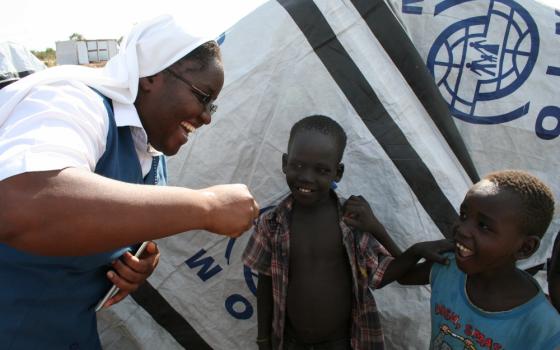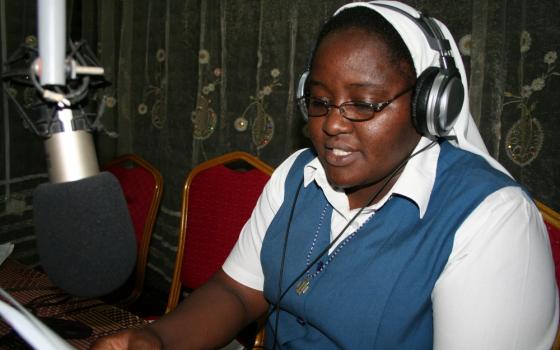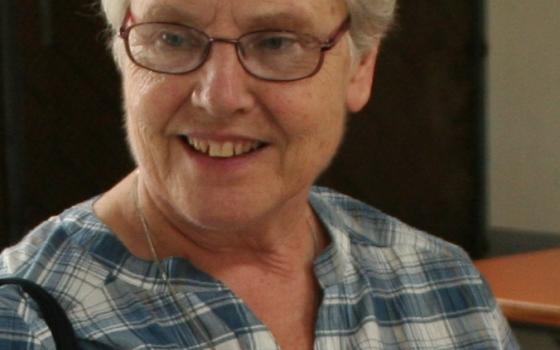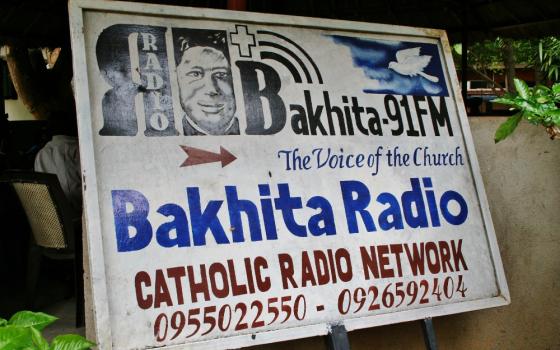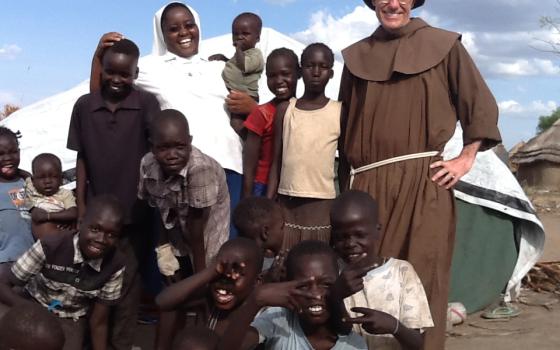Early in April, not long before Holy Week, Sr. Anne Kiragu sat down in front of a microphone at Bakhita Radio, the Juba Catholic Archdiocese’s station, pulled out 15 pages of prepared text and began recording a month’s-worth of weekly radio broadcasts, four in all.
It was a hot day – rainy season in South Sudan had just begun – and Kiragu, 37, acknowledged that, at first, she was not at her best. She was perspiring a bit, and wiped her brow. But as air conditioning gradually cooled the studio, chasing out the warm and sticky heat, Kiragu seemed to catch her rhythm. She recorded the four broadcasts in quick succession, about seven minutes each, and only tripped up, ever-so-slightly, twice.
Kiragu’s voice, with a distinct Kenyan lilt and cadence, was steady, firm and even. Her Easter messages sometimes dealt specifically with the problems facing South Sudan. In one, Kiragu spoke about inviting “the Lord to walk with you in your work, in your prayers, in your offices; walk with him in our hospitals, among the internally displaced people here in Juba, walk with him among the orphaned and there let him break for you the bread of understanding, and the bread of compassion to share life with them.”
In another message, later broadcast on Holy Wednesday, Kiragu spoke poignantly about betrayal, citing that theme from Matthew’s Passion narrative and placing it in the present context of South Sudan’s current difficulties.
“For a practical living of the word of God today let us ask ourselves: Whom have I betrayed in this crisis in South Sudan?” she asked. “Have I betrayed anyone today or even these days? Have I sold my people, my friends, my neighbors here in South Sudan and participated too in forcing them out of their own country? Have I been kind enough to save life and protect the life of those close to me, or have I been out for their destruction? In these incidences have I not betrayed the Lord? Let us ask the Lord for pardon for yielding to our weaknesses.”
Inspiring and moving – but also pointed and directed to a particular problem: the very real unsettledness of Juba right now. Kiragu is a tough critic of her own work: “I am always looking for ideas to improve the program,” she said.
Once she finished, Kiragu let out an easy, deep and hearty laugh, something of her trademark.
“Patience! This is our life,” she said of her tasks that morning.
But Kiragu might as well been speaking of the day-to-day in Juba, a place that has known war and violence all too well during a decades-long drive for South Sudan’s independence and is only now returning to some normalcy – and only uneasily and perhaps temporarily – since new political violence erupted in late December.
“We work and pray for peace. When peace comes, we’ll all be.”
“All be” signifies a sense of rest. And to spend time with Sr. Anne, or Sr. Annie as some call her, is to spend time with a young woman in constant motion.
In my nearly two weeks in South Sudan, this superior for a small Daughters of St. Paul community of four in Juba was a guide, go-to-person, and even “fixer.” She spent a good part of one Saturday morning helping me get a cell phone operating (an effort that ultimately failed).
Kiragu is good company – funny, open and wise to life’s joys and absurdities – and her colleagues like and respect her.
“She embodies the joy of the Gospel that Pope Francis has encouraged,” said Sr. Annette St. Amour, an Immaculate Heart of Mary nun who is currently on assignment with Solidarity with South Sudan, a consortium of more than 200 religious congregations performing humanitarian work.
But Kiragu is no one’s fool. She was crisp and a bit curt when a young salesman at an outdoor market tried to sell her a gift shirt for a colleague leaving Juba.
“He wanted 150 (South Sudan pounds) for that shirt,” she said, incredulously after trying to barter the salesman down to 100 pounds. “I bought another shirt like that for 50 yesterday!”
I got a chance to see Kiragu in various roles during my assignment. In addition to her work at the radio station (named after Josephine Margaret Bakhita, a Sudanese Canossian sister who was eventually declared a saint), I saw Kiragu meet a group of displaced women and their children at a displacement camp outside of Juba, a regular stop for her. (She delighted the children with her laughter.)
A strong proponent of the need for good relations between the various religious and missionary groups, Kiragu is good in informal settings, meeting with sisters of other orders and gleaning bits of news and gossip. She believes the recent violence has only united the Catholic religious in the country and brought them closer.
Kiragu also helps oversee the Pauline Book and Media Center run by the Daughters of St. Paul, and is relieved that, as she puts it, “the dissemination of good Christian formation literature” has returned somewhat to normal in Juba, and is proud that the bookstore is a destination for many religious and even political figures in the country.
“People feel very lucky that we have our bookstore,” she said, beaming. “We feel we are part of the formation of this society.”
Kiragu is also a keen observer of the every-day, noting with relief that schools are back running (“Wow – that means the process is moving, but it doesn’t mean peace is imminent”), but she is also mindful of the terrors experienced in Juba just months ago.
“Look,” she said, stopping me not far from the bookstore entrance. There we saw and heard uniformed school children on recess – a welcome sight. But the young people were passing outside a hospital where only months before bodies of those killed in political violence were dropped off; people didn’t know where else the bodies should go. She looked sad and stricken, recalling the memory.
One evening, Kiragu played host, along with Sr. Pushpa Cheeramkunnel from India, who shares the small Juba compound of the Daughters of St. Paul. Over a dinner of baked chicken, pasta, wine and fresh fruit, the two sisters mused about events in recent months and the life of foreign missionaries in South Sudan.
“The mission itself is difficult,” Kiragu said, “but there are some realities I’ve come to accept. Sometimes, though, it doesn’t make it any easier.”
Both sisters expressed one particular frustration: South Sudan faces a literacy crisis. Though figures vary, as many as eight out of 10 people may not be able to read or write, and the problem is particularly dire among women.
Kiragu recalled hearing about a 58-year-old military commander – she doesn’t remember if he was a member of the government forces or the rebels trying to topple the current government – entered a Catholic school and asked to be enrolled in a reading class.
“But he’s carrying a gun,” Kiragu recounted. “The teacher said he could join the class, but without the gun. She told him, ‘Children should not be exposed to such things.’ Well, he left and never came back.”
She paused, musing about the story. “How could you have someone who had never been to school be a commander?” she said, shaking her head. “It’s quite difficult here, it’s quite difficult.”
It is. I was told almost immediately upon arrival that the intersection of two unpaved streets just up the way from the sisters’ compound is, or at least was, a drop-off point for gun traffickers.
The sisters confirmed the rumor. “So many guns, so many guns,” Cheeramkunnel said. “It makes no sense.”
What does make sense for the religious like themselves is to plant seeds for the future, and to try to ease tensions, even in small ways, in a place where war was the norm for the better of a half century and where the legacy of violence has seeped, perhaps too easily, into the life of the everyday.
Kiragu recalls meeting one young man who had a government job but who felt his ethnic identity had kept him back – with resulting loss of wages and harm to his family. In the wake of the recent violence, he told Kiragu it was best for him “get fighting.”
“I will kill if I have to,” he told her.
She and other sisters talked to the young man, reminding him that the cycle of violence will only keep spiraling out of control until people like him make up their minds to stop it.
“I saw him recently and he waved at me,” Kiragu said. “So I knew he was in a better place.”
Even so, the threats of violence are real, and contribute to an atmosphere of grievance. Listening to both South Sudanese and non-Sudanese, I got the sense that South Sudanese often see foreigners as “grabbing what is ours,” as someone put it. Meanwhile, outsiders believe they are made to feel unwelcome in a country where some think, rightly or wrongly, direct confrontation is prized over talking things over.
Still, there are areas where many find common ground. One is a keen appreciation and need for both Sudanese and non-Sudanese to work together and strengthen civic life.
“I feel the violence will end at some point, so I am optimistic,” Cheeramkunnel said. “But there is not a strong foundation to work from, to build this country, given the history. So the question is: how do you do it?”
Another point of common ground? The respect South Sudanese people have for religious – both women and men – who have stayed through the recent violence and continue their commitment to the people of South Sudan.
“People were very, very happy that we stayed, and many have appreciated that and told us that,” said Cheeramkunnel.
True – but challenges are common for the religious. Doing pastoral work is always difficult in South Sudan, whether because of poor infrastructure and roads or because there aren’t enough people to do what Kiragu believes is the necessary work for Christian formation.
“There aren’t enough channels. Priests don’t visit families, people go from Mass to Mass, but there is nothing in between; churches are only open on Sundays. You have to reach people in their own context, and that can be difficult,” she said.
“South Sudan as a country is quite big and the dioceses are, as well,” Kiragu explained.
“However, priestly and religious vocations are scarce. This makes it difficult to reach the Christians wherever they are.”
It can take a priest months to attend to all of his parishes and sub-parishes, and “distance here is an issue, and some places are also inaccessible.”
Even travel in and around Juba can be difficult. One example: “Now that we are entering rainy season it is a nightmare to travel,” she said. “I’ve been stuck (in a car in mud) three times in Juba – in Juba! The capital!”
Such frustrations have dogged Kiragu from the start of her time in South Sudan – and almost made her give up. Several days after our dinner together, Kiragu recounted that barely a year into her assignment that began in 2012, she thought about returning home to Kenya.
“But I rethought it,” she said. “I started trying to understand the people, and then I learned Arabic. I like a challenge, to learn languages. Now I am happy. When I learned the language, life eased.”
There were also deeper currents at work.
“I realized they are good people who are living on their history, they are living on their pain, their depression,” she said. “They are good and loving people.”
Still, Kiragu’s sense of call and her journey to South Sudan were, and remain, far from a straight line, though both are rooted in a strong heritage of service. Her late mother worked with women’s groups and had been a neighborhood leader in Nairobi, where Kiragu grew up. Her father wanted Kiragu – the seventh of nine children – to become a doctor. Kiragu completed her secondary education in 1996 at a mission school run by the Assumption Sisters of Nairobi.
After a year of discernment and deciding to embrace religious life (though not teaching), she eventually joined the Daughters of St. Paul. Along the way she received degrees in philosophy and theology, studying Italian (the order’s official language) in Rome, and doing mission work in Tanzania.
Kiragu made her final vows in 2008. Eager to work in South Sudan, she was told at first she was too young and inexperienced. But in 2012, she arrived, “full of fire to work.”
She acknowledges her call to South Sudan has a certain sense of the mystical to it. “It’s been a big mystery,” she said, laughing, about her journey to South Sudan, and it began during her secondary school days, when she met her friend Akujo, a South Sudanese.
“Akujo always told me about the difficulties in her country and the war that lead her to run to Kenya. And she told me repeatedly, ‘Annie, one day you also try to come to my country.’ I did not understand what she meant.”
Ironically, Kiragu’s friend eventually married, and the bond between the young women continues.
“I came to serve the family and friends of Akujo, and in the people I meet every day in my apostolate, I see her spirit and the desire to help her people build better lives,” Kiragu said.
“And I do whatever I can to support the lives of the people here with much joy and fulfillment. That is why I wanted to come to South Sudan.”
Despite the attendant frustrations in South Sudan, Kiragu now feels the country is home – and will be for the foreseeable future. Assuming her mandate is extended, Kiragu could remain in South Sudan for a total of six years.
“What I’ve seen in the last two years makes me feel we need to be here. Someone told me, ‘Sister, Sister, God meant for you to be here.’ ”
There is much to do. Recalling the bullet-strewn streets of December, the need for education and literacy (particularly among women and girls) and the trauma borne by both old and young alike, Kiragu and her fellow religious in South Sudan are a determined group right now.
“I feel like we don’t have structures that protect life, that develop life,” Kiragu said of South Sudan’s current predicament.
“This should not be the human condition,” she mused one afternoon as a late-day rain storm moved in over Juba. “What’s next? That’s the question.”
[Chris Herlinger is a contributing writer to NCR on humanitarian and international issues, an author and the senior writer for Church World Service.]
Related - Living the joy of the Gospel by Sr. Anne Kiragu
South Sudan reports by Chris Herlinger - Easter hope for South Sudan and
Women hold society together amid war
On NCRonline.org - In South Sudan, 'everything they are doing, they are doing with tears'
